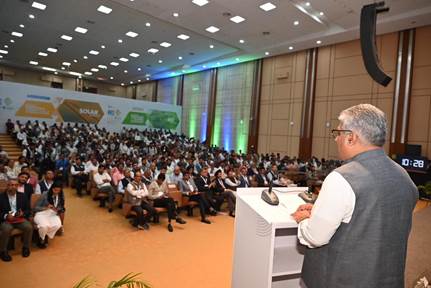Gandhinagar: Union Minister for Environment, Forest, and Climate Change, Bhupender Yadav, addressed the Plenary Session on India’s Pathway to Net-Zero Emissions at the RE-Invest Summit 2024 today, held at Mahatma Mandir in Gandhinagar, Gujarat. The event, which was inaugurated by Prime Minister Narendra Modi on September 16, brought together leaders and experts in renewable energy and sustainability.
Joined by Union Minister for New and Renewable Energy Pralhad Joshi, Bhupender Yadav outlined India’s commitment to achieving Net-Zero emissions by 2070, highlighting the critical role of sustainability in conserving ecosystems, biodiversity, and fostering societal development.
A Call for Sustainable Development
During his address, Yadav stressed the need for a technological and management system that can drive global sustainability efforts. He emphasized the importance of policy, technological interventions, and capacity building to create a world that prioritizes equity, ensuring that health, justice, and prosperity are accessible to everyone. “Countries should develop action plans that promote social equity and inclusive, sustainable economic growth while safeguarding natural resources for future generations,” he said.
India’s Low Emission Contribution
Yadav noted that while India represents 17% of the world’s population, it accounts for just 5% of global emissions, compared to developed countries, where 17% of the population contributes to 60% of global emissions. Despite its vast and diverse geography, India has made significant strides in reducing carbon emissions, even with its relatively low per capita energy consumption.
The Minister underscored India’s achievement as the only G20 country to meet two out of three Nationally Determined Contributions (NDCs) targets from the Paris Agreement nearly a decade ahead of schedule. Under Prime Minister Narendra Modi’s leadership, India is taking climate action not only for environmental protection but also to drive economic and human development.
Mission LiFE and the Role of Private Sector
Highlighting India’s commitment to sustainability, Yadav spoke about Mission LiFE (Lifestyle for Environment), initiated by the Ministry of Environment, which encourages actions like saving water, reducing waste, adopting sustainable food systems, and saying no to single-use plastics. These initiatives are designed to create eco-conscious lifestyles and promote sustainable living.
Yadav also emphasized that achieving Net-Zero by 2070 will require private sector engagement, particularly in areas such as renewable grids, low-carbon technologies, and demand-side management. He called for the rational utilization of fossil fuel resources, the development of low-carbon transport systems, and sustainable urbanization that balances economic, ecological, and social factors.
Bio-Based Policy Interventions and Global Cooperation
The Minister highlighted the government’s bio-based policy initiatives, which focus on fuel switching, recycling, and the circular economy, along with the promotion of green hydrogen technology. India is also focusing on empowering the MSME sector and fostering international cooperation, particularly to support the Global South in climate efforts.
Looking ahead to COP29, Yadav mentioned that India’s focus will be on capacity building, climate finance, and setting quantifiable goals. He also emphasized the role of the carbon market and the Green Climate Fund, noting that economic viability and technology transfer are essential for building a renewable energy market.
Summit Participation
The summit saw the participation of key figures, including former Secretary of MoEFCC and Chairman & Managing Director of Solar Energy Corporation of India, R P Gupta; Officer on Special Duty of Government of India, P K Singh; as well as stakeholders, subject experts, and other dignitaries from the renewable energy sector.





